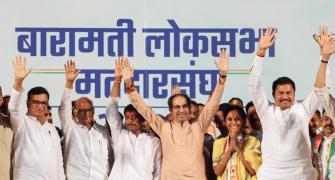Contrary to popular perception, exporters feel they may, at best, reap short-term gains out of the depreciating rupee against the dollar. The gains, they say, would not be sustained, and too much volatility in exchange rates does not benefit them. "Any good exchange rate is beneficial for exporters. But too much volatility is not good. There will be some short-term gains, but in the long run, this would not sustain," said Rafeeque Ahmed, chairman, Council for Leather Exports. Ahmed said since the last few years, the rupee had been averaging Rs 43-44 against the dollar.
"Any good exchange rate is beneficial for exporters. But too much volatility is not good. There will be some short-term gains, but in the long run, this would not sustain," said Rafeeque Ahmed, chairman, Council for Leather Exports. Ahmed said since the last few years, the rupee had been averaging Rs 43-44 against the dollar.
"Today's rise has been the highest in the last two years. Too much appreciation and too much depreciation, are both not good for exporters. Customers today are aware of the global scenario, and they want everything at the best price," he said.
The Federation of India Export Organisations (FIEO) said the sudden changes in the value of the rupee did not benefit exporters. "Sudden changes in the position of the rupee do not really matter much. Exporters these days resort to hedging against such risks (of volatility),"
There is apprehension that the robust growth in exports in the first five months of this financial year may not be sustained due to the slowdown in the euro zone, and the contagion effects this may have. The International Monetary Fund (IMF), in its recent World Economic Outlook, had pointed to the risk of the euro zone crisis running beyond the control of policymakers.
Experts feel a sharp deterioration in the crisis would hurt exporters, in spite of the benefits of the rupee's depreciation. IMF's observation is seen as a warning to European policymakers not to adopt half-baked measures to solve the crisis.
"Basically, the IMF meant policymakers there would have to bite the bullet," said Ficci secretary general, Rajiv Kumar. "If the crisis deepens, it would affect our exports more than the benefits given by the rupee's depreciation," he said. The European Union countries account for 17-18 per cent of India's exports. D K Joshi, chief economist, Crisil, said the benefits of the depreciating rupee would be neutralised by the hit to exports.









